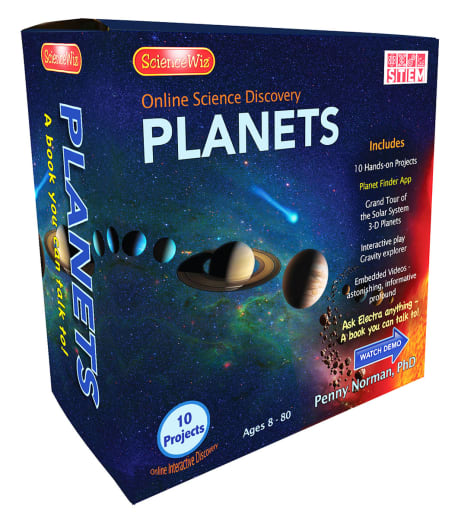A book you can actually talk to!? Yes, sir! This is not a physical book, but a 52-page digital one that’s easy to navigate on a phone, tablet, laptop, or desktop computer. Special software is not needed, but you will need an internet connection. Includes 10 fun projects with embedded links: Take a grand tour of the solar system, play related videos and discover amazing facts, locate the planets, explore gravity, and much more. You can ask the avatar, Electra, any questions you have about the solar system as you go, and she will answer! This kit also includes modeling materials, paints, two brushes, and step-by-step instructions for building a scaled model of the planets. Educational and fun for a wide range of ages!
ScienceWiz Online Discovery Science Kit - Planets
Product Overview
- This kit includes an interactive online book with embedded videos and explorations
- Also includes materials for a fun planet project!
- Ask Electra anything about the solar system and she’ll answer!
Description
- Build a model of the 8 planets in the Solar System to scale.
- Take a 4K video tour of Mars’ varied landscapes, as seen by three of NASA’s rovers!
- Spin through 3D models of the planets, moons and asteroids.
- Ponder the existence of giant diamond icebergs floating in liquid carbon oceans deep inside the largest planets.
- Learn about deep oceans of water encapsulated beneath the surfaces of a number of planetary moons and even inside the dwarf planet, Pluto. Do these oceans harbor life? We are going to find out.
- Watch as your view of the Earth telescopes out to the edge of the Solar System in the video, The Pale Blue Dot, narrated by Carl Sagan.
- Discover how our understanding of gravity has evolved from Newton to Einstein. Manipulate, spin, model and ponder space-time.
- Which is the most studied meteorite ever to have landed on Earth? What has it revealed about the early history of the Solar System and the origins of life on Earth?
- Explore a spectacular set of gravity simulators to monitor near-Earth astroids; to watch Earth’s lost Moon escape; to examine exoplanets in other Solar Systems; and to visualize what happens when galaxies collide.
- What is an equinox? What is a solstice? What causes the seasons? How have the cycles of the Earth guided humans toward an understanding of the cosmos? Do other planets have seasons?
- Take a brief but intriguing look at the history of astronomy. Learn about the breakthrough events that led to our current understanding of the cosmos.
- Have a question? Select the Electra ICON and she will materialize. Converse with her by either speaking or typing. Click her away to return to the book.
Incorporate these highly educational science kits into your child's future lessons. The projects and experiments introduced in these kits cover an enormous expanse of information that will provide for a fairly in-depth study of the featured topic. These kits were designed for young children to use in a highly independent setting; parental supervision is usually kept to a bare minimum. The book is filled with vibrantly colored illustrations that provide for a pictorial guide that is easy for even the youngest of children to follow and understand. Most materials necessary for the experiments are included within the kits, although some common household materials may also be needed.~ Enh
| Product Format: | Other |
|---|---|
| Grades: | 3-9 |
| Brand: | Norman and Globus |
| EAN/UPC: | 630227050016 |
| Length in Inches: | 8 |
| Width in Inches: | 8 |
| Height in Inches: | 4 |
| Weight in Pounds: | 0.85 |

